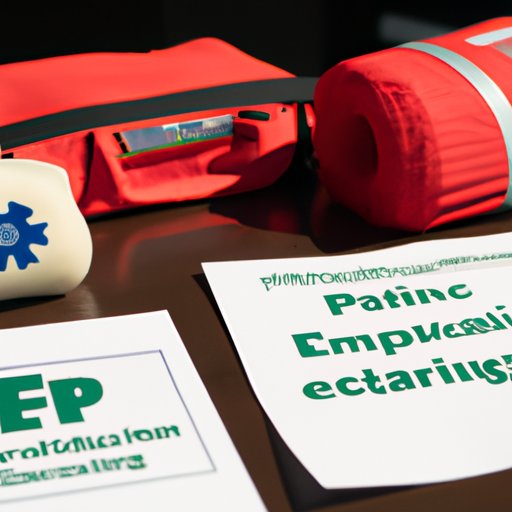Introduction
Paramedics are vital members of the healthcare system, providing life-saving medical services to those in need. Becoming a paramedic requires extensive knowledge and training, as well as dedication and hard work. But how long does it take to become a paramedic? In this article, we explore the length of training, education, and experience needed to become a paramedic.

Interviewing Paramedics to Understand the Length of Training
One way to understand the length of training required to become a paramedic is to interview paramedics who have already gone through the process. Some questions you might ask include:
- What type of program did you go through to become a paramedic?
- How long did the program last?
- What types of courses did you take?
- Did you have any clinical or field experience?
- Did you have to take any exams?
By speaking with experienced paramedics, you can gain a better understanding of the length of training needed to become a paramedic. It’s also important to understand that there are different types of training programs available, such as online or in-person programs, which may affect the length of training.

Exploring Different Levels of Paramedic Education and Certification
The National Registry of Emergency Medical Technicians (NREMT) provides certification for paramedics. To become certified, paramedics must complete a state-approved paramedic program and pass the NREMT exam. This exam covers topics such as airway management, patient assessment, and pharmacology. The NREMT exam must be taken within two years of completing a paramedic program.
In addition to the NREMT exam, each state has its own requirements for certification. These requirements vary from state to state, so it’s important to research the specific requirements for your state.
Examining State-Specific Requirements for Becoming a Paramedic
Each state has different requirements for becoming a paramedic, so it’s important to research the specifics of your state. Generally, states require paramedics to have a high school diploma or equivalent, complete a paramedic program, and have at least one year of experience as an emergency medical technician (EMT). Additionally, some states may require paramedics to have additional certifications and/or continuing education credits.
It’s also important to understand that each state has different licensing and recertification requirements. For example, in some states paramedics must renew their license every two years, while in others they must renew every four years. Additionally, some states require paramedics to complete continuing education credits in order to maintain their license.
Investigating the Role of Experience in Becoming a Paramedic
Experience is an important factor in becoming a paramedic. While some paramedics may choose to gain experience through on-the-job training, others may choose to shadow experienced paramedics. Shadowing experienced paramedics can provide invaluable insight into the day-to-day operations of a paramedic, as well as teach paramedics the skills needed to succeed in the field.
It’s also important to understand that gaining experience as a paramedic takes time, so it’s important to allocate the necessary amount of time to gain the experience needed to become a successful paramedic. Additionally, many paramedics choose to specialize in a certain area, such as pediatrics or trauma, which may require additional training and experience.

Analyzing the Impact of Time Commitment on Becoming a Paramedic
Becoming a paramedic requires a significant amount of time and commitment. Depending on the type of program chosen, paramedic training can take anywhere from six months to two years to complete. Additionally, paramedics must allocate time to gain the necessary experience to become a successful paramedic. Depending on the state, paramedics may also need to take continuing education credits and renew their license every two to four years.
Ultimately, becoming a paramedic requires dedication and hard work. It’s important to understand the length of training, education, and experience needed to become a successful paramedic, as well as the time commitment required to maintain certification.
Conclusion
Becoming a paramedic is a rewarding career, but it requires dedication and hard work. In this article, we explored the length of training, education, and experience needed to become a paramedic. We discussed the importance of interviewing paramedics to understand the length of training, examining state-specific requirements for certification, investigating the role of experience in becoming a paramedic, and analyzing the impact of time commitment on becoming a paramedic. Ultimately, becoming a paramedic requires a significant amount of time and effort, but the rewards of saving lives make it worth it.
(Note: Is this article not meeting your expectations? Do you have knowledge or insights to share? Unlock new opportunities and expand your reach by joining our authors team. Click Registration to join us and share your expertise with our readers.)
